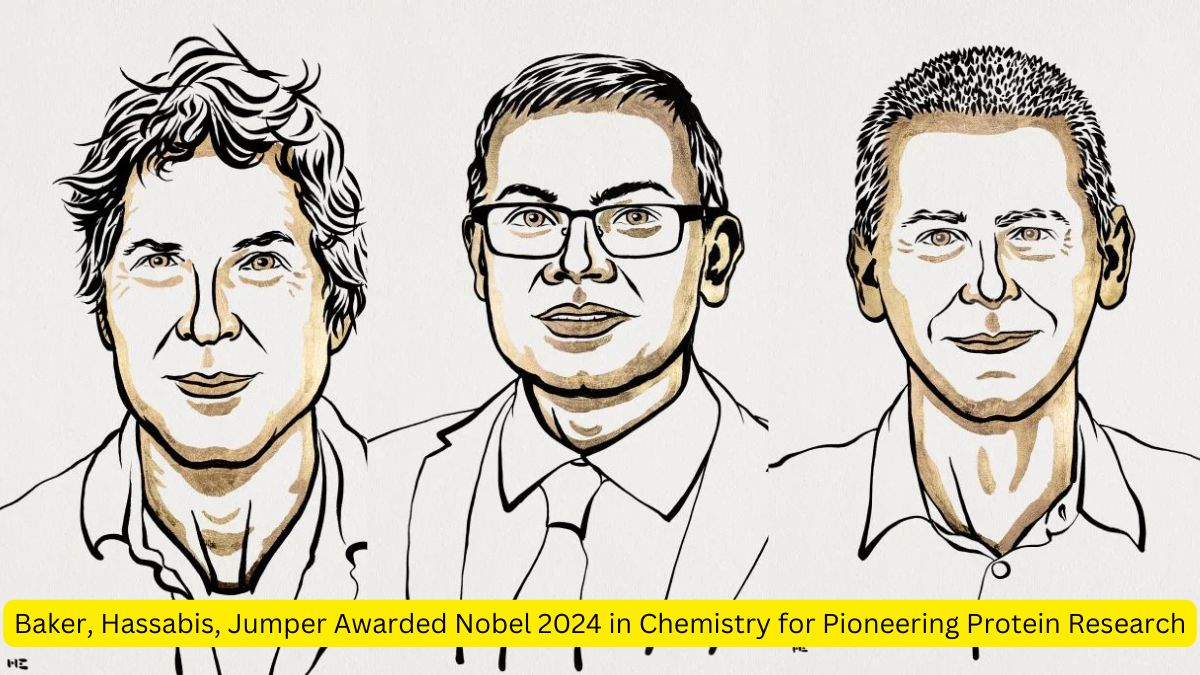The 2024 Nobel Prize in Chemistry has been awarded to David Baker for his innovative work in computational protein design and to Demis Hassabis and John M. Jumper for their groundbreaking AI-based protein structure prediction. These discoveries, recognized by the Royal Swedish Academy of Sciences, represent major advancements in understanding and designing proteins.
Details
Awarded by : The Royal Swedish Academy of Sciences
Winners
- Half of the prize awarded to David Baker (University of Washington, Seattle, WA, USA)
Recognized for computational protein design.
- The other half was awarded jointly to Demis Hassabis (Google DeepMind, London, UK), John M. Jumper (Google DeepMind, London, UK)
Recognized for protein structure prediction.
Discovery Focus
Proteins
- Fundamental chemical tools in all living organisms.
- They control and drive essential chemical reactions that sustain life.
- Serve various functions as hormones, antibodies, signal substances, and building blocks of tissues.
Importance of Proteins
- Proteins consist of 20 different amino acids.
- Their function is determined by their three-dimensional structure, which is formed by the folding of amino acid chains.
David Baker: Computational Protein Design
Milestone Achievement (2003)
- David Baker succeeded in designing a new protein, unlike any existing natural protein.
- Since then, Baker’s research group has created numerous new proteins for pharmaceuticals, vaccines, nanomaterials, and tiny sensors.
- His work involves reengineering life’s building blocks to create imaginative and functional proteins.
Demis Hassabis and John Jumper: Protein Structure Prediction
Problem Solved
- Since the 1970s, predicting protein structures from amino acid sequences has been a major scientific challenge.
- The complex folding of amino acids into 3D structures was difficult to determine but crucial for understanding protein function.
Breakthrough in 2020
- AlphaFold2, an AI model developed by Hassabis and Jumper, successfully predicted the structures of virtually all 200 million known proteins.
- Impact of AlphaFold2 has Widely adopted by over 2 million users from 190 countries.
- Used in a wide range of scientific applications, including, Understanding antibiotic resistance.
- Visualizing enzymes capable of decomposing plastic.
Why These Discoveries Matter
- The ability to design new proteins and predict protein structures opens up enormous possibilities for science and medicine.
Applications of These Discoveries
- Developing new drugs and vaccines.
- Addressing challenges such as antibiotic resistance.
- Creating environmentally friendly materials, including enzymes that break down plastic.
Benefit
- These discoveries represent breakthroughs in biology that provide immense benefits to humankind by offering new ways to combat diseases and solve pressing environmental issues.
About David Baker
- David Baker, born 1962 in Seattle, WA, USA.
- PhD 1989 from University of California, Berkeley, CA, USA.
- Professor at University of Washington, Seattle, WA, USA.
Demis Hassabis
- Demis Hassabis, born 1976 in London, UK.
- PhD 2009 from University College London, UK.
- CEO of Google DeepMind, London, UK.
John M. Jumper
- John M. Jumper, born 1985 in Little Rock, AR, USA.
- PhD 2017 from University of Chicago, IL, USA.
- Senior Research Scientist at Google DeepMind, London, UK.
Prize amount
- 11 million Swedish kronor, with one half to David Baker and the other half jointly to Demis Hassabis and John Jumper.
| Summary/Static | Details |
| Why in the news? | Nobel Winner Chemistry 2024 |
| Awarded by | The Royal Swedish Academy of Sciences |
| Winners | – David Baker (University of Washington, USA)
– Demis Hassabis (Google DeepMind, UK) – John M. Jumper (Google DeepMind, UK) |
| Discovery Focus | Proteins – Fundamental chemical tools that sustain life, including hormones, antibodies, and enzymes. |
| David Baker’s Contribution | – Pioneered computational protein design in 2003.
– Designed new proteins for pharmaceuticals, vaccines, nanomaterials, and sensors. |
| Demis Hassabis & John M. Jumper’s Contribution | – Developed AlphaFold2, an AI model that predicts protein structures from amino acid sequences.
– Solved a long-standing problem of predicting protein folding and structure. |
| Breakthrough (2020) | AlphaFold2 predicted the structures of nearly all 200 million known proteins. |
| Impact of AlphaFold2 | – Adopted by over 2 million users globally.
– Used in scientific fields like antibiotic resistance and plastic decomposition. |
| Applications | – Development of new drugs and vaccines.
– Addressing antibiotic resistance and creating environmentally friendly materials. |
| Benefits | These breakthroughs provide solutions to combat diseases and tackle environmental issues. |




 India Launches Zero Prize, Paying Big fo...
India Launches Zero Prize, Paying Big fo...
 ‘Boong’ Puts India on the Map with First...
‘Boong’ Puts India on the Map with First...
 'One Battle After Another' Dominates 202...
'One Battle After Another' Dominates 202...








